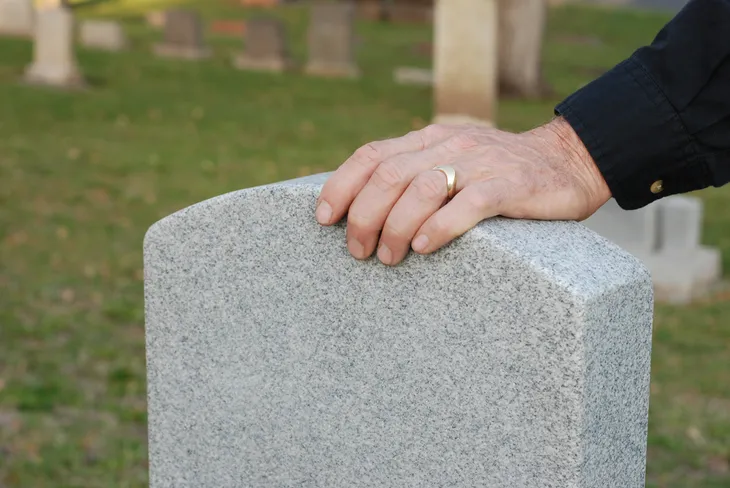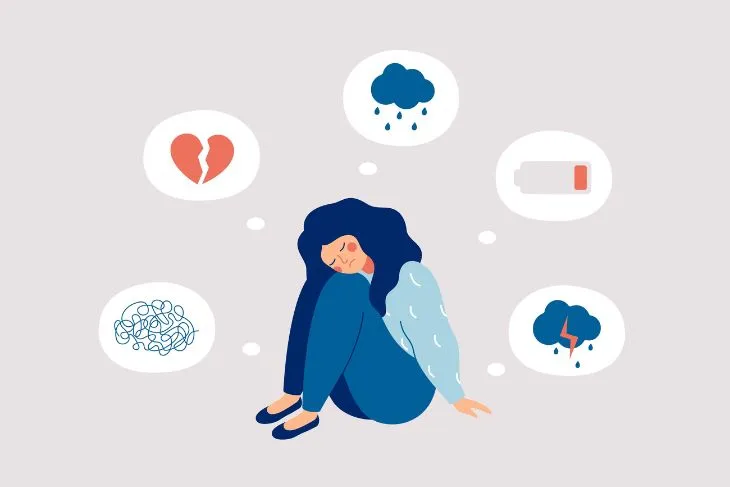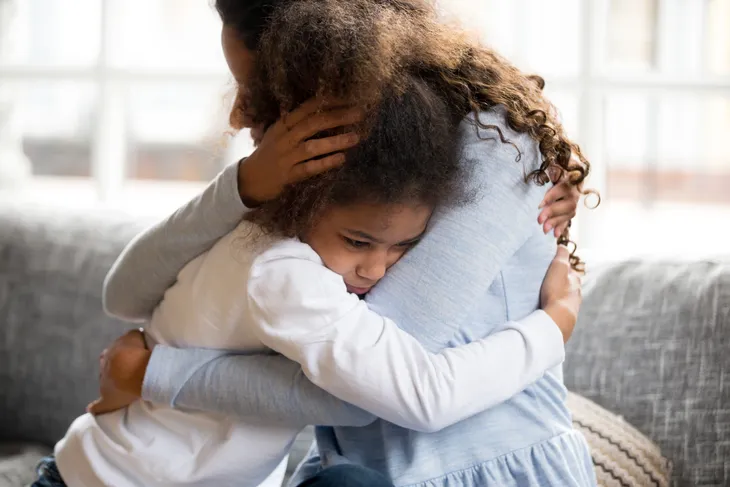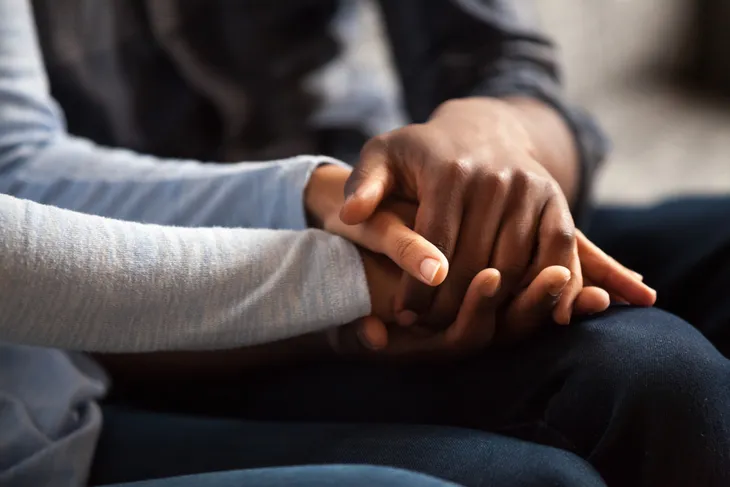- Anticipatory grief occurs ahead of a loss, usually after a loved one receives a terminal diagnosis.
- The most common signs are tearfulness, loneliness, anger, anxiety, emotional stress, irritability, social withdrawal, and a desire to talk.
- There are four stages to anticipatory grief which aren’t necessarily linear. The first is acceptance, feeling concern, rehearsing a loved ones passing, and finally imaging the future.
- When coping it’s important to share feelings openly, maintain hope, and be prepared for what’s to come.
Grief is a tricky thing that most of us will have to experience at some point in our lives and we all deal with it a little differently. Depending on the loss, it can take a huge toll on our emotional wellbeing, and certainly takes some time to recover. For most people, the sadness of losing a loved one never goes away, but rather we just learn to live more comfortably with it.
When we know a loss is coming, some people experience anticipatory grief. When we think of grief, we often think of it as something we go through after a loss, but it can sometimes happen in anticipation of it. To learn more about anticipatory grief, we take a look into what it is, the most common signs and causes, as well as some tips on how to cope with it…
What is Anticipatory Grief?
Anticipatory grief is essentially what it sounds like — grief that happens before a loss. You are anticipating a major life-altering event. It’s a completely normal part of the grieving process, but not every person has it. It’s essentially a painful awareness that they are about to lose someone they love.
It typically occurs when a loved one has been diagnosed with a terminal illness or has been dealing with a chronic illness. But the grieving can be about more than just one thing. Some people use this period to prepare for all the ways their life is going to change, explains VeryWell Health. For example, roles in the family may be changing, losing financial security or having to come to terms with future dreams not coming true. It can also be a period of immense personal growth and an opportunity to find closure.
Anticipatory Grief vs. Conventional Grief
While anticipatory grief is a normal part of the mourning process, it’s a bit different than conventional grief. Forbes talked to Allison Werner-Lin, PhD, a licensed clinical social worker and associate professor at the University of Pennsylvania’s School of Social Policy and Practice in Philadelphia who compared conventional grieving to “grieving backward” whereas anticipatory grief is looking forward.
According to VeryWell Health, another difference comes in the emotions attached to it. Anticipatory grief contains a lot more anger, loss of emotional control, and atypical grief responses. The feelings may be heightened because these people are caught in an “in-between” place, explains the source. People often struggle to find a balance between holding onto hope and learning to let go.
When we’re forced to anticipate a loss, we also have to picture what the future will look like without this person, but at the same time we can never know that. “As a result, we lose our sense of safety and security, leading to a range of stressful emotions that may not be felt after a loss has occurred,” writes the source.
The Purpose of Anticipatory Grief
It’s neither good nor bad to have anticipatory grief. However, in some cases it can serve a purpose. It can provide an opportunity for personal growth at the end of life, says VeryWell Health. A way to find meaning and closure. A chance to reconcile any differences, grant forgiveness, and make sure nothing is left unsaid. Essentially, it’s the ability to say goodbye which is not something everyone gets with their loved one.
The source goes on to explains that while some people avoid visiting loved ones while they are sick because they don’t want to remember them that way, it doesn’t have to be viewed as a bad thing. It can also be a chance for healing. A 2011 study found that women who experienced anticipatory grief while their husbands were terminally ill with cancer were able to find meaning in their situation prior to losing them.
Does it Help?
Some people have little to no anticipatory grief while a loved one is terminally ill, whereas others begin grieving before they are even gone. While it might seem like grieving ahead of a loss would help prepare a person for what’s to come, it doesn’t necessarily work like that. Sometimes the grief they experience in anticipation is even more severe than after they are gone.
“There is not a fixed amount of grief a person experiences when they lose someone,” writes VeryWell Health. Even if their health has been in decline for a long time, their eventual passing will still cause a great deal of pain and possibly even shock. However, VeryWell Health does note that anticipatory grief can help provide people with closure. This is something people who lose loved ones suddenly don’t get.
The source also refers to studies which found evidence for both arguments. There have been studies that show anticipatory grief made the period of conventional grief easier, but there are also studies showing the opposite or that it had no effect at all. Thus, it’s a very personal thing and can be different for everyone.
 Shutterstock/Photographee.eu
Shutterstock/Photographee.euCauses of Anticipatory Grief
Caregivers who are about to lose a loved one are the most likely to experience anticipatory grief, but this isn’t the only time it happens. Forbes points out that any kind of looming change can bring on anticipatory grief. Werner-Lin tells the source it can even happen in instances where the person is anticipating this change and has even chosen it for themselves.
According to TalkSpace following are the most common causes or instances of when anticipatory grief may occur:
- A loved one is diagnosed with a degenerative disease, such as Alzheimer’s, dementia, or Parkinson’s disease
- A child is diagnosed with a chronic (or possibly terminal) disease
- The impending loss of a pet
It can also occur in situations that affect both the individual and their loved one, notes TalkSpace. For example, an impending organ transplant, end of life care for a loved one with a terminal illness, a loved one facing an amputation or major medical procedure, a new job, relationship, move, or teenager leaving home, as well as in-utero complications or premature birth. In these scenarios, both individuals will have concerns about their uncertain future.
Symptoms of Anticipatory Grief
Common Emotions
Everyone experiences grief differently. There’s no set checklist of emotions that a person will have, but overall there are some common ones that most people experience. Of course, the most obvious is sadness and tearfulness. VeryWell Health points out that feelings of sadness tend to come on rapidly and unexpectedly. Any little thing can set them off, and sometimes it might be totally random (i.e. a commercial, a passerby on the street).
They will likely experience fear. This relates to being scared of what’s to come after their loved one passes and fear of the unknown or all the changes that are about to occur. They will likely be irritable and angry about their situation and why it’s happening to them. Loneliness is another common one. VeryWell Health explains that caregivers or people close to someone who is terminally ill often feel isolated and are living in a state of constant heightened anxiety.
Lastly, a common emotional response is guilt. They might feel guilty about the fact that they are the one who will go on living. You feel guilty for wanting them to be rid of their pain, but also knowing it mean they’ll know longer be alive. Or guilt about things that happened in the past (i.e. arguments and time wasted).
Physical Symptoms
Not all the symptoms are emotional. There can even be some physical responses to anticipatory grief. One of these is that the person will feel this strong desire to want to talk, says VeryWell Health. “Loneliness can fuel a need to talk to someone — anyone — who might understand how you feel and listen without judgement,” writes the source. “If you don’t have a safe place to express your grief, these emotions can lead to social withdrawal or emotional numbness.”
Anticipatory grief can also cause a person to start rehearsing what to do when a loved one passes. They might start imaging what life is going to be like and making arrangements. You might start to feel guilty about these thoughts, but VeryWell Health notes they are completely normal. Just like conventional grief, anticipatory grief can lead to physical symptoms like trouble sleeping and memory issues.
Stages of Anticipatory Grief: Stage 1 and 2
There are four recognized stages of anticipatory grief. However, Forbes points out they don’t necessarily occur in this order and there is no “finish line” with grief. It’s a never-ending process. You might experience each stage in one day with every emotion and then none the next. You might think it’s over and all done, only for it to all resurface and start over again weeks later.
According to the University of Rochester Medical Center, a nonprofit research university in Rochester, New York, the first phase is acceptance. You accept that a loved one will soon be gone. “This phase often co-occurs with feelings of sadness and depression,” writes Forbes. The next phase is to feel concern for the person or loved one who is terminally ill. For the loved one, this phase might bring feelings of regret about past disagreements or mistakes. In the case of the person who is sick, they might begin to experience fear about what’s to come.
Stages of Anticipatory Grief: Stage 3 and 4
The third stage is to rehearse and make arrangements for what’s to come. They will start preparing for the impending loss of their loved one. This includes making funeral arrangements, saying goodbye and voicing other concerns that relate to what might happen in the time immediately following their loss.
The fourth and final stage is imaging the future, says Forbes. Friends and family members will try to picture what life looks like without their loved one. What is going to happen during the holidays? Birthday parties or important milestones like weddings and graduations? They’ll think of all the objects they are leaving behind. On the other hand, the individual who is sick will have similar visualizations but from the perspective of thinking what it will be like for their loved ones. They might also imagine what they’ll experience during the final moments of their life.
Anticipatory Grief and Age
While people of all ages can experience anticipatory grief, research has shown that younger people tend to have a more severe reaction or intense experience. A review of 15 studies exploring anticipatory grief and illnesses was examined by doctors at the University of Illinois at Chicago. The findings showed “younger caregivers and younger patients tended to report higher ratings of anticipatory grief,” writes Forbes.
One study in particular on adults with terminal cancer found that patients under the age of 25 experienced more anticipatory grief than those aged 26 to 55. VeryWell Health also refers to a study that found children and teens of parents with cancer had fears about what their life would look like and who would care for them after their parent or grandparent passed away.
Treatment and Counseling
When a loved one receives a terminal diagnosis, it’s normal to go through some form of anticipatory grief. However, sometimes it can be so severe or intense that it interferes with everyday life or a person’s ability to cope with what they are going through.
It’s not uncommon for people who are experiencing anticipatory grief to also develop depression, says VeryWell Health. Dealing with a profound loss and such a life-altering event is extremely difficult and a heavy burden to carry. Not only that, but it can be hard to differentiate between grief and depression. Seek help from a medical professional if you’re having difficulty coping with a loss. They can help determine whether it’s “normal” grief or “complicated” grief.
How to Cope with Anticipatory Grief
There are many ways to cope with anticipatory grief. The first step is to acknowledge and validate any feelings. TalkSpace suggests getting educated on what to expect throughout the grieving process, particularly what anticipatory grief entails. Next, find someone to talk to. It can be anyone. A support group is a great place to start because the people in these communities understand what you’re going through. They offer a safe place for people to express their feelings and lean on others for emotional support.
Another important thing to do is to reach out to family and friends. These are the people who love and care about you. They want to help, so let them. While it might seem impossible to continue living when a loved one is sick, it’s important not to put life on hold. You can’t take care of someone if you’re not taking care of yourself, notes the source.
Lastly, talk to your loved one about what you are feeling. They might be able to help settle any unresolved feelings. Discuss their end-of-life wishes. Make amends and have all the tough conversations. Tell them how much they mean to you. They might not be able to do what they used to, but you can still make memories and enjoy the time you have with them.














